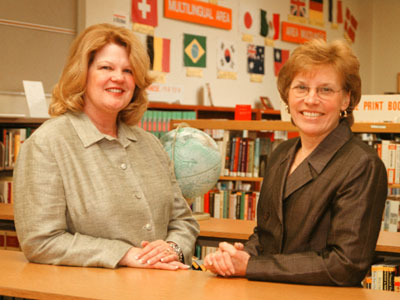
When Richard Lowry retires in February, San Benito County’s
three largest school district’s will be headed by women
– Jackie, Jean and Judith.
Jackie Munoz and Judith Barranti were the first women
superintendents of their school districts
– Aromas-San Juan Unified School District and Hollister School
District, respectively.
And Jean Burns Slater, who will begin her tenure at the San
Benito High School District on Feb. 3, may be the first woman to
head that district, according to Tim Foley, county superintendent
of schools.
Three is the number – three women, three J’s and more than 30 years of experience in education each.
When Richard Lowry retires in February, San Benito County’s three largest school district’s will be headed by women – Jackie, Jean and Judith.
Jackie Munoz and Judith Barranti were the first women superintendents of their school districts – Aromas-San Juan Unified School District and Hollister School District, respectively.
And Jean Burns Slater, who will begin her tenure at the San Benito High School District on Feb. 3, may be the first woman to head that district, according to Tim Foley, county superintendent of schools.
More women climbing the ladder
While all three agree that their gender is not a qualification for their position, they like seeing more diversity in their ranks.
“I think we’ve shown through other professions in our country that women can do the same jobs as men,” Barranti said. “(But) I don’t personally regard gender as being a plus or minus. I do the best job I can and hope that will show through.”
National statistics show that the percentage of superintendents is predominately male, but California is more representative of the population. Munoz has noticed such a trend.
“There’s been a real shift (in the number of women superintendents). When the county superintendents would get together, I’d be the only woman superintendent,” said Munoz, who has been the leader of ASJUSD for almost two years. “It was the same thing at regional meetings, I’d be one of two or three women in the room.”
The three have also been able to rise above old stereotypes prevalent during their childhood years.
“When I was growing up, it was teachers, nurses and secretaries (for women),” Munoz said. “I felt societal pressures, not any from my parents. I come from a long line of women who worked.”
The good ol’ boy system seems to be breaking down, Slater said. She sees more women recognizing their leadership qualities.
Different ways of thinking
Because women who are mothers tend to spend more time at home with their children than men do, they can bring different insights to jobs in education.
“I think women have a tendency to have extra empathy with kids; they know what it’s like to be a kid and a parent because they’ve lived it more sometimes,” Slater said.
Munoz agreed, saying that men don’t always see the same side of being a parent that a woman does.
Women can also be more solution oriented. Munoz said women tend to want to get into meetings and get something done and get out.
“Men and women work differently and that’s OK,” she said. “Women bring a diverse view to the table. There are many ways to solve issues.”
Peter Gutierrez, HSD’s assistant superintendent, has worked with a male and female superintendent and doesn’t notice a difference. He said it’s not so much about a person’s gender as what they bring to the their position.
No feelings of intimidation
All three women wanted to be teachers when they were little. Barranti and Slater rose through the ranks from teacher to principal to superintendent and Munoz went from teacher to restructurer of schools to superintendent.
While moving up the ladder, the three said they did not feel any intimidation from male colleagues.
“I was raised with lots of brothers – I didn’t feel intimidated. I’m on solid ground,” Slater said.
Munoz said she hasn’t ever felt intimidated, even when she was the only female superintendent in the county.
“There was so much expertise in the room, but I didn’t feel intimidated because they were male. I was just learning and listening,” she said.
But Slater said there were times where she’d have an idea at a meeting, but it wasn’t acknowledged until a man said it. But it never bothered her as long as the idea was noticed, she added.
Does gender matter?
Even though women can bring different views to their profession, it doesn’t make them better or worse suited for a job than men.
“(These three women) bring wonderful perspective to those positions,” Foley said. “They are very dedicated and deal straight forward with issues, but I don’t know if that’s because they’re women or that they’re exceptional people.”
Slater said school districts need both ways of thinking – male and female – so that there’s a mix. She said it’s important for people to work as a team regardless of gender, race, creed or other issues.
The fact that gender doesn’t determine what jobs people should do has opened doors for both genders. Both boys and girls grow up being told they can be anything they want to be.
“Everybody has the opportunity in this country, in this day and age to make their future what they want,” Barranti said. “Everybody can pursue their dreams, male or female, no matter what.”









